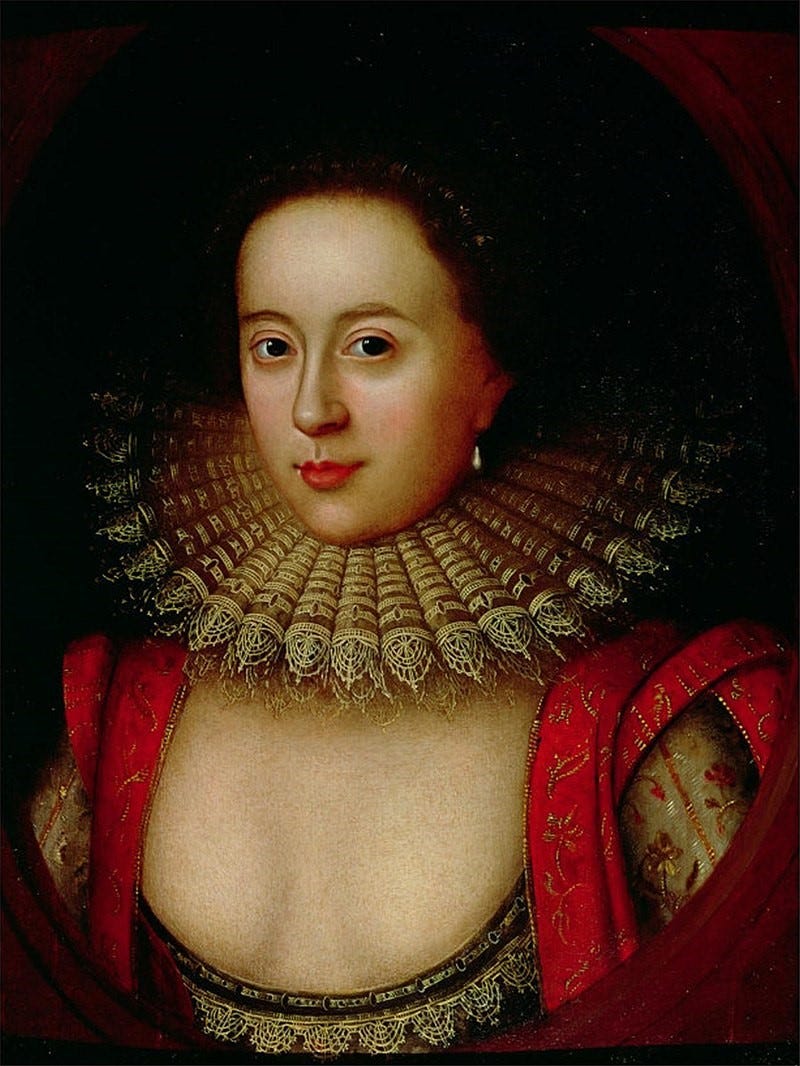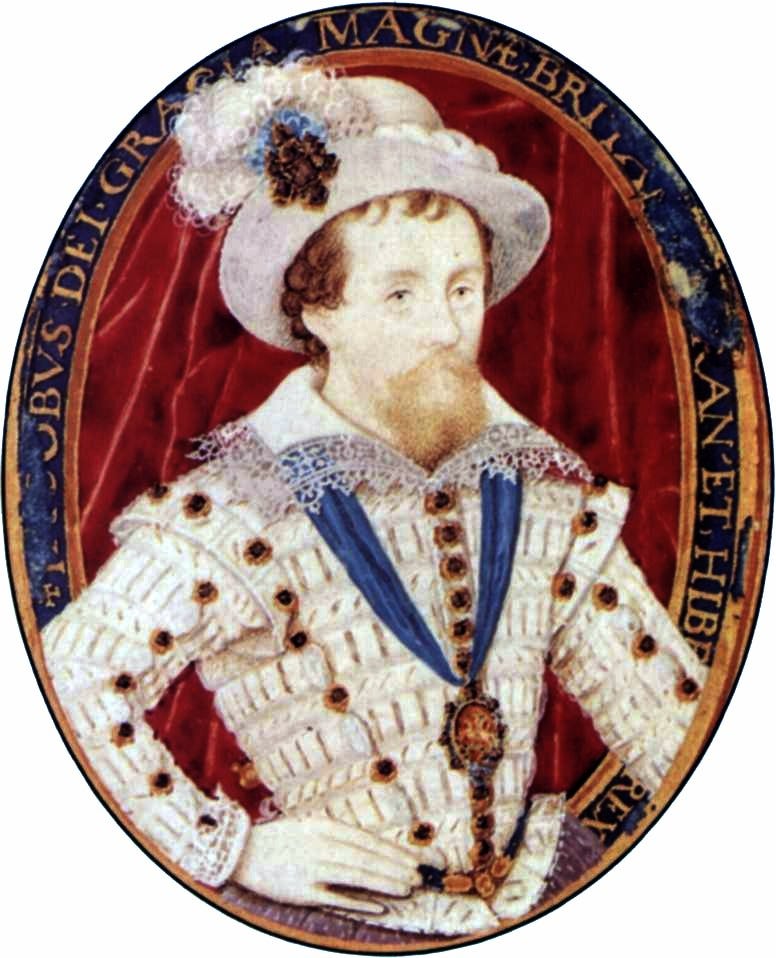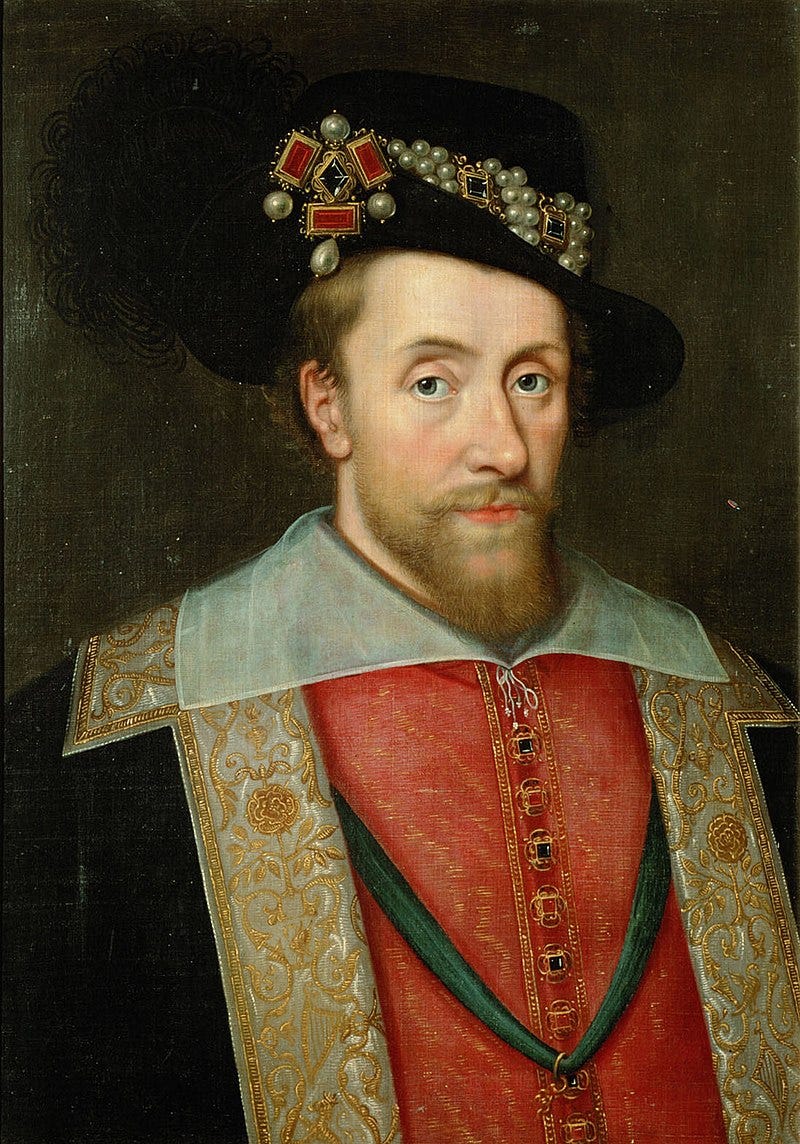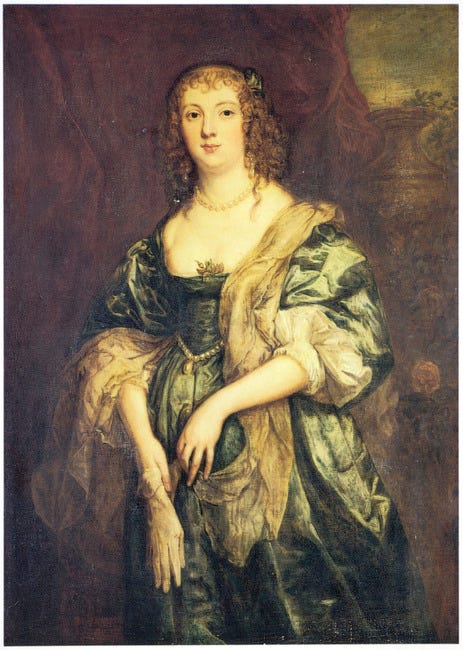The Countess of Somerset was a Woman of Extraordinary Beauty. She was also a Murderess.
Then, as now, there was one set of rules for the rich, and another for the rest of us.
Frances Howard was a happy accident of nature: a woman so astonishingly beautiful, nothing was denied her. As a consequence, she became spoiled and willful, not in the way of a romantic paperback heroine with her saucy head tosses and heaving bosom, but fatally. As in brooking resistance from no one, even if it meant poisoning them with a series of jellies that withered before the eyes of horrified onlookers. Even if it meant tainting an enema with “white diamonds of spiders,” knowing the agonizing death it would bring.
The problem with people who have been badly indulged since the cradle is that they will stop at nothing to get what they want.
Nothing.
On May 31, 1590, Frances was born into the semi-royal house of Howard, a family that had already produced two ill-fated queens of England, Anne Boleyn and Kathryn Howard, both of whom died by the executioner’s sword. They were an alluring breed, these Howard women, adept at driving a man to passion, despair, and also to murder.
Frances had shapely lips, which she reddened with cochineal paste. Her eyes were alight with the promise of sensual fulfillment and a sort of animal magnetism. Released from its confine, her hair fell in a rippling blonde waterfall to the floor. Here was a woman alive to pleasure and adventure, who set all hearts aflame, including young Prince Henry’s. And yet, her father, the Earl of Suffolk, married her at the age of fourteen to the thirteen-year-old Robert Devereux, Earl of Essex. It was, by all accounts, a most advantageous match.
The devil of it was, Robert repulsed her.
Thinking the two needed time to grow into wedded bliss, their families separated them. Essex was dispatched to Europe for his obligatory Tour; Frances was sent to Court, where she was subject to all the flattery, seduction, and intrigue a beautiful young woman could hope for. The attention went to her head like strong wine. Before long, she’d fallen in love with handsome Robert Carr, 1st Earl of Somerset.
Carr’s patron and lover was none other than the king.
King James I, a Scots by birth, had been instantly besotted by his much younger countryman after Carr broke his leg during a tilting match. James rushed out to the field to attend to the ruddy-cheeked Carr who, having failed to acquit himself in a battle of chivalry, at least understood how to ingratiate himself to his king. In this he was abetted by his friend Sir Thomas Overbury, poet, essayist, and intriguer, who greatly outmatched Carr in intelligence.
Overbury poured words into Carr’s ear; Carr repeated them to His Majesty, only too willing to borrow Overbury’s wit and take all the credit for it. Under Overbury’s tutelage, Carr’s ascent from poor Scotsman to English noble was nothing short of meteoric. In 1611, he was made a viscount and appointed to the Privy Council. Two years later, he became the Earl of Somerset and was made Treasurer of Scotland. In 1614, he was then elevated to the senior-most position of the royal household, that of Lord Chamberlain—equivalent these days to being the CEO of Google.
Two problems arose: Carr had no aptitude for paperwork and delegated most of it to his friend Overbury, including state matters of enormous delicacy that never should have been delegated. The other problem was Frances.
The more Carr yearned for her, the more distasteful he found sleeping with the king. Letters have survived of James complaining to Carr about his suddenly disappearance from their bed.
Frances wasn’t content to be the paramour of the king’s favorite. She wanted to divorce her husband and marry Carr. Essex was back from his Tour by then, seemingly prepared to consummate the marriage. She would have nothing to do with him. As a safeguard against Essex asserting his husbandly prerogative, Frances and her new confidant, Mrs. Anne Turner, visited the notorious Dr. Simon Forman.
Forman was an occultist, astrologer, necromancer, and a quack who trafficked in love potions for the noble elite. Most of the Court frequented his dingy quarters to have their horoscopes cast, to obtain abortifacients (usually, a handful of herbs and a long ride in a hell-cart), to beseech him for a love spell, or in Frances’s case, an anti-love spell.
Hoping to obtain an annulment of her marriage based on Essex’s “incapacity,” she bought potions that were intended to render him impotent. As it happened, Essex was already a deeply conflicted young man, unable to have congress with any woman, Frances included.
Still, she wasn’t taking any chances.
There were other hurdles to overcome. Frances had to submit to a gynecological examination by ten matrons and two midwives to ensure that her virginity was still intact. The bother of it was, Frances was no virgin, having first been the mistress of Prince Henry (likely, but not definitively proven) and then Carr.
Alleging a need for modesty, she appeared before her inspectors with her face covered by a thick veil. No one believed the panel’s expert opinion that her hymen was intact. A rumor persistently circulated that Sir Thomas Monson’s daughter had been substituted at the last minute, and even from the vantage point of history, that seems quite likely. They were of a similar build, and Frances could not have possibly passed such a purity test.
At her divorce trial, Essex blusteringly claimed that he was capable with other women, just not with Frances, who took pleasure in reviling him as a “cow, coward, and a beast.” The annulment languished, no one having any idea how to vote in the matter and still keep his position, until the king himself facilitated the proceedings by appointing two extra “judges.” Frances and her lover were married a few months later.
But there was one man for whom this news was most unwelcome: Sir Thomas Overbury. He despised Frances—the whole Howard clan, in fact, due to their leech-like hold on English politics. In the most forceful terms, he’d tried to dissuade Carr from marrying her.
For once, Carr refused to listen, foolishly relaying Overbury’s objections to Frances, who kept a careful tally of her enemy’s words. She was not a woman to be gainsaid. Her wrath, once incurred, remained forever, and because of his proximity to Carr, Overbury knew all her dirty secrets.
In the Court of King James, the existence of virtue was of far less consequence than the appearance of it. If Frances was proven to be a harlot and a liar, it would have dire consequences not just for her and Carr, but for her entire family. Once again, she recruited her old friend Anne Turner, and together, they schemed to get rid of the meddlesome Overbury.
The Howards likely thought themselves “reasonable” when they bade the king to offer Overbury the post of Ambassador to Russia. Overbury declined, as they knew he would. The king threw him into the Tower for his obstinacy, and from his cell, Overbury wrote letter after letter to Carr, reminding him in the plainest terms of what was owed to him.
Whether Carr was complicit in what happened next remains unclear, but Frances herself bribed an apothecary’s apprentice named James Franklin to bring her poisons, which were then used to taint the jellies and tarts she sent to Overbury in the Tower. Overbury’s manservant, Richard Weston, confessed that he’d been paid by Frances to administer poison in other ways, too, news which the Lieutenant of the Tower was quick to relay to the proper authorities. Overbury took to having his food cooked under supervision and in his own kitchens. Unfortunately, death came in the form of a poisoned clyster, or enema, which Overbury took to relieve himself of constipation.
He writhed in agony for hours before exhaling his last.
The circumstances surrounding Overbury’s death raised suspicions, but not enough to open an investigation. Two years later, Franklin the apothecary made a deathbed confession, laying before the entire world this sordid business. Now, King James was unable to ignore it.
Frances and her husband were arrested for the murder in October of 1615. She appeared before the court in her most dazzling clothes, a fan held daintily before her blushing cheeks in a show of female modesty. Seats at her Westminster trial were gobbled up weeks in advance: ten pounds for a pair, fifty for a box. Everyone wanted to see a Howard daughter brought low.
She admitted her guilt. Carr, however, did not, although he was found guilty of being an accessory after the fact when witnesses claimed he’d burned incriminating documents and paid bribes to cover up his wife’s involvement. They were both condemned to death, a sentence which was then commuted to imprisonment in the Tower. After five years, that sentence too was commuted. The disgraced couple was pardoned in 1622, and permitted to live out their natural lives in whichever estate best pleased them.
Frances’s co-conspirators, Richard Weston, Anne Turner, the Lieutenant of the Tower, and a handful of others were sentenced to death by hanging.
God, it would seem, has always been less merciful to the poor.
During her confinement in the Tower, Frances gave birth to a daughter, Anne, who later became Lady Russell, Countess of Bedford. The historical record remains silent as to how Frances conducted herself after her pardon, but it is unlikely that a woman with her temperament would have adapted easily to life in exile. Whatever affection she may have had for Carr, and his for her, surely suffered, either making them a torment to each other or victims of mutual indifference.
There has been a movement of late to sanitize Frances’s image. A novel, The Poisoned Bed by Elizabeth Fremantle is an example of this kind of whitewashing, making Frances a victim of her circumstances instead of an agent of death. I call foul. No part of the historical document indicates that Frances was a victim of anything except her own selfish disdain for others.
Like all historians, I have an ax to grind, but until further evidence is made available that exonerates her, I prefer to take an Occam’s Razor approach to who and what she was: Rich. Spoiled. Entitled. Mercenary.
Killing Overbury doesn’t make Frances a feminist.
It just makes her yet another member of the aristocracy that got away with murder.
Copyright © 2022 Stacey Eskelin
Weigh in here! I want to hear what you have to say. There’s a comment section for you to share your thoughts.







Yeah, I was busy swimming upstream as well, though I'm a little old to be spawning....
Rich. Spoiled. Entitled. Mercenary. And why not? When had she ever been denied anything of consequence?
The rich have always played, and been judged by, very different rules.
Quelle surprise.
Death by enema; yeah, that's a new one for me. One of the things I always wonder about is, how the fuck did they ever even learn about that? Like what, were people just sitting around the table saying, "yeah, let's shove this up our ass and see what happens?" Plus, I mean, dude, eat a salad FFS.
The "Lady" Somerset was a little outside the time frame of my readings, but the only people whose fingerprints are more deeply imprinted upon English history of the 16th C. than the Howards were the Tudors themselves.
It took me a moment to track (in my own mind) who "Prince Henry" was -- my library of 16th C. history is among those books that are packed away. It finally hit me: The son -- eldest son, in fact -- of James I, who by all accounts was a fairly dashing fellow of real intellect. And he would have been king except that for all of his brains and charm he went swimming in the Thames and ended of dying from (as I recall) one of the "Ty's" (Typhus, Typhoid; nasty.) One of the few people who could stand up to his father, had he lived he might also have been able to save the life of Walter "Wat" Raleigh. Instead, "Water" (As QE1 affectionately teased him, due to his heavy, Devonshire accent) went to the block because James 1 was a self-righteous prick. His next-in-line son, Charles, began the long and tedious demonstration of why Stuarts were never meant to be Kings of England. (After a century of going back and forth with it, the English ultimately went to Hanover, Germany, just to get anyone else, and Bonny Charley was left in France.)